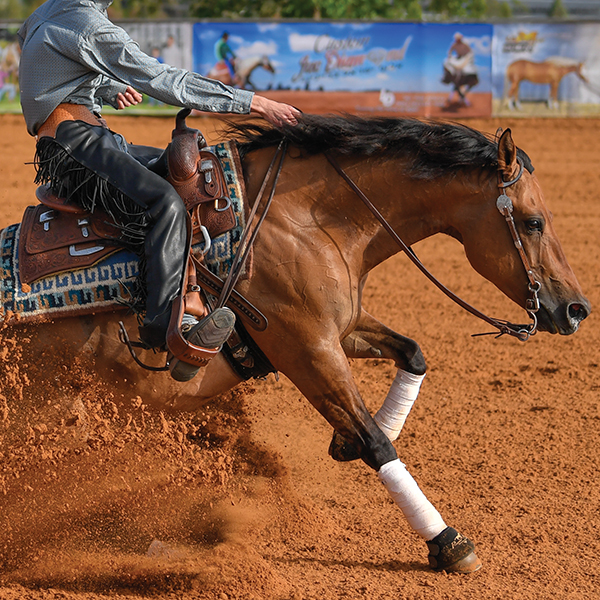For most horse owners and riders, a horse is much more than a pet; it is truly a partner. Some equines are heavily relied on in competitions, events, ranch and farm work, and more. Just like human athletes, performance horses have an increased need for certain nutrients, and deficiencies in these nutrients can lead to suboptimal performance.
What constitutes a performance horse? Typically, performance horses are trained or ridden more days than not within a given week. Regardless of discipline, any horse that is actively trained, ridden, or may carry or pull a load can be described as a performance horse. “Exercise increases a horse’s nutrient requirements over that of a horse at rest,” states Ashley Fowler, Ph.D., Nutritionist at Kentucky Equine Research (KER), so careful consideration must be given to properly feeding and supplying nutrients these working horses require.
Feeding guidelines for performance horses will “greatly depend on the workload, discipline, and body condition of the horse; [however] all diets should start with forage that is free of mold, weeds, and other debris,” according to Dr. Fowler. When choosing a grain for your performance horse, remember the horse will need to take in enough calories to meet its energy needs above those calories provided by forage.
Horses in light exercise “will have an increased requirement for energy, protein, minerals needed for bone [health] (calcium, phosphorus, and magnesium), as well as electrolytes (sodium, potassium, and chloride), and vitamin E,” Dr. Fowler states. Horses doing more than light exercise will also have increased requirements for trace minerals. Fortified concentrates formulated specially for performance horses are available. While it is important to consult with your veterinarian or an equine nutritionist before making any changes to your horse’s diet, also be sure to follow the feeding recommendations on the bag for your horse’s specific weight and workload. This will ensure the nutritional requirements are met.
Dr. Fowler recommends free-choice access to a salt block or adding salt directly to your horse’s feed to meet the requirement of sodium. On hot, humid days when your horse has lost excess fluid to sweat during training, consider feeding an electrolyte replacement to help replenish those key minerals.
While not required, Dr. Fowler suggests some exercising horses could benefit from prophylactic joint support. Through extensive research, Kentucky Equine Research has developed a specific supplement that is a source of high molecular weight sodium hyaluronate that contributes significantly to the maintenance of cartilage health and elasticity, joint fluid viscoelasticity, and lubrication of the entire joint mechanism.
It is important to also note that performance horses run a greater risk of developing gastric ulcers. Dr. Fowler suggests, “increasing the time spent eating forage, adding some alfalfa to the diet, and feeding forage prior to exercise” as ways to reduce this risk. She also recommends adding oil to your horse’s diet, specifically, “one containing the fatty acid GLA,” as a measure to further reduce the risk of gastric ulcer development.
Many horse owners and trainers find that supplementation helps their horse(s) perform better. Brittany Stang, local horse trainer and barrel racer, began supplementing (under her vet’s advice) her personal barrel horse with pure MSM (methylsulfonylmethane) and then moved to a hyaluronic acid joint supplement fortified with MSM. Brittany also gives a supplement that helps aid normal blood cell heath. This helps her horse maintain energy which assists in performance demands. She cautions horse owners and riders to tailor any supplementation with your performance horse’s specific needs through a ration evaluation done by an equine nutritionist and even obtain blood work through your vet if possible. “The performance work must match the supplementation you’re providing,” Brittany states.
Feeding a horse that is regularly exercised is more than opening a bag of grain. Being mindful of the increased demand for certain nutrients, vitamins, and minerals these horses need is of utmost importance. Providing your performance horse with the correct caloric intake, nutrients, and supplements can help keep you both in the winner’s circle.









